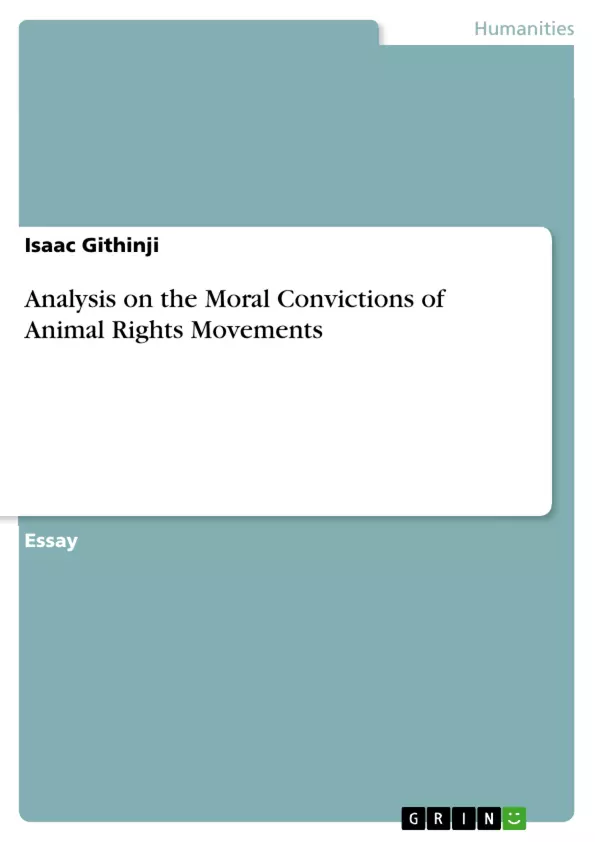The issue of equality has dominated society for quite some time now, with numerous organizations and movements being developed to urge for equality. The equality aspect takes many forms depending on the issue at hand, which have ranged for the demand for gender equality, fight against racial discrimination, equality for people from varied class levels, and so
on. In recent times, however, issues of equality and promotion of equal rights for all have moved from being restrained to human beings and now covers even non-humans. Different scholars, organizations, and movements have been developed to fight for non-humans.
An example includes the animal rights movement, or animal liberation forum, which is a social movement that deals with halting of the stiff legal and moral discrepancy put between human beings and animals. The movement tends to culminate the prominence of animals as possessions and terminate their use for consumption, to make clothing, in research, as well as in entertainment industries.
Inhaltsverzeichnis (Table of Contents)
- Analysis on the Moral Convictions of Animal Rights Movement
- Animal Rights Movement vs. Environmental Movement
- Short-Term Benefits and Long-Term Deconstruction
- Implications of Animal Rights for Predation and Population Control
- Moral Considerations and Sustainability
- Limitations of Animal Rights Movements
- Conclusion
Zielsetzung und Themenschwerpunkte (Objectives and Key Themes)
This text analyzes the ethical arguments surrounding the animal rights movement, comparing and contrasting its perspectives with those of the environmental movement. The primary objective is to explore the potential conflicts between these two movements, specifically concerning their different approaches to animal welfare and the implications of these contrasting philosophies for achieving environmental sustainability.
- Animal Rights and Moral Convictions
- Environmental Sustainability and Population Biology
- The Conflict between Animal Rights and Ecological Conservation
- The Implications of Animal Rights for Predation and Overpopulation
- The Practicality and Applicability of Animal Rights Principles
Zusammenfassung der Kapitel (Chapter Summaries)
- Analysis on the Moral Convictions of Animal Rights Movement: This chapter introduces the animal rights movement as a social movement advocating for equal rights for animals and challenging the existing legal and moral distinctions between humans and non-human animals. The chapter outlines the two main schools of thought within the animal rights movement: animal rights advocates who emphasize the moral rights of individual animals and utilitarian liberationists who argue for animal welfare based on the principle of minimizing suffering.
- Animal Rights Movement vs. Environmental Movement: This chapter explores the contrasting approaches of the animal rights movement and the environmental movement. It highlights the differences in their ethical frameworks and objectives, particularly regarding the use of animal resources. While the animal rights movement focuses on animal rights and moral considerations, the environmental movement emphasizes sustainable resource utilization and population biology.
- Short-Term Benefits and Long-Term Deconstruction: This chapter examines the potential consequences of the animal rights movement's principles for environmental conservation. It argues that while the movement's concerns might offer short-term benefits, its long-term implications could undermine the goals of environmental movements, particularly in relation to population control and the natural process of predation.
- Implications of Animal Rights for Predation and Population Control: This chapter explores the potential ramifications of extending moral rights to animals for the natural balance of ecosystems. It discusses the implications of viewing predation as a violation of animal rights and how such a perspective might lead to unintended consequences, such as animal overpopulation and disruptions to the carrying capacity of habitats.
- Moral Considerations and Sustainability: This chapter delves deeper into the practical aspects of aligning animal rights principles with sustainable practices. It argues that the strict adherence to moral considerations for animals, as advocated by some animal rights proponents, could lead to impractical scenarios and hinder sustainable resource utilization, potentially increasing suffering for animals in the long run.
- Limitations of Animal Rights Movements: This chapter examines some limitations of the animal rights movement. It discusses the selective focus on endangered species and the lack of equal consideration for all animals, suggesting that the movement's approach might not fully align with broader environmental sustainability goals.
Schlüsselwörter (Keywords)
Animal rights, environmental movement, sustainability, moral convictions, population biology, predation, overpopulation, speciesism, utilitarianism, animal welfare, ecological conservation, legal rights, moral rights.
Frequently Asked Questions
What are the two main schools of thought in the animal rights movement?
The movement consists of animal rights advocates who emphasize the inherent moral rights of individual animals, and utilitarian liberationists who focus on minimizing suffering and maximizing animal welfare.
How does the animal rights movement differ from the environmental movement?
While the animal rights movement focuses on the moral standing and rights of individual animals, the environmental movement prioritizes sustainable resource utilization, population biology, and ecological conservation.
What are the potential conflicts between animal rights and ecological conservation?
Conflicts arise regarding predation and population control. For instance, protecting individual animals from predation or halting culling programs can lead to overpopulation, which disrupts the carrying capacity of habitats and harms the ecosystem.
What is the animal rights movement's stance on animals as property?
The movement seeks to end the status of animals as possessions and aims to terminate their use for human consumption, clothing, research, and entertainment.
Does the animal rights movement treat all species equally?
The text suggests a limitation of the movement is its selective focus on endangered or charismatic species, rather than providing equal consideration for all animals in alignment with broader sustainability goals.
What are the long-term implications of animal rights for environmental conservation?
The analysis argues that while animal rights may offer short-term benefits, strict adherence to its principles could undermine long-term environmental goals like sustainable resource use and natural population management.
- Citar trabajo
- Isaac Githinji (Autor), 2019, Analysis on the Moral Convictions of Animal Rights Movements, Múnich, GRIN Verlag, https://www.grin.com/document/1167292



